 Statistics show that most students who drop out of University, do so in their first year. In fact, most drop out in their first semester. What is the number one reason? Grades. How is it possible that students who achieve an 80-90% average in high school, find themselves struggling with a C-average in their first semester in University? There are a number of reasons, and one common thread, which is that they likely chose the wrong school, the wrong program, or both. The following are factors considered when selecting a post-secondary school. Many people consider only one or maybe two of them, when choosing a post-secondary school and program, when if fact, all of these factors should be carefully considered:
Statistics show that most students who drop out of University, do so in their first year. In fact, most drop out in their first semester. What is the number one reason? Grades. How is it possible that students who achieve an 80-90% average in high school, find themselves struggling with a C-average in their first semester in University? There are a number of reasons, and one common thread, which is that they likely chose the wrong school, the wrong program, or both. The following are factors considered when selecting a post-secondary school. Many people consider only one or maybe two of them, when choosing a post-secondary school and program, when if fact, all of these factors should be carefully considered:
1) Should I choose the best school and program? Every parent wants their son or daughter to attend the best school, and any student, serious about his or her education, wants to as well. However, the best or most reputable school is not necessarily the best school for you. It’s all about finding the right fit. One of the most important keys to success in College or University is your ability to adapt and feel at home in your environment. If you don’t, then no matter how smart you are, you are unlikely to perform your best. In the end, the question you need to ask yourself is this: Is it better to get a C-average and possibly drop out of the best school in the country for your program, or complete your program with an A-average from the 3rd, 4th, or 5th best school?
2) Should I choose a school close to home or out of town? Some students thrive at school when they can sleep in their own bed, regularly eat home-cooked meals, and have daily support from their family and closest friends. Others are motivated by the experience of being away from home, can adapt quickly to change, and embrace new experiences. There is no shortage of examples of kids who desperately want to attend school out of town, or even out of country, either because it’s the most reputable school for their program of choice, or just to be away from home, only to discover after only one or two months, that they are homesick. If this happens, their grades will suffer, possibly to the extent that they drop out. It might be a good idea for students wanting to live in residence, to spend a week or two away from home, perhaps at a retreat, with other students, to see how well they adapt, before making a decision.

3) Is it OK to choose a school based on the fact that my friends are going there? Just like choosing a location, some students like the comfortable surroundings their friends provide, while others are eager to step outside of their comfort zone and make new friends. Students who want to stay close to their friends should ask themselves if their friends are good role models who will positively influence them when the going gets tough. Conversely, students wanting to attend a school where none of their friends will be, should ask themselves if they feel they can thrive, while trying to make new friends and fit in socially, without the support of their close friends. Here too, there is no absolute right or wrong answer, as everyone is different.
4) Does school culture matter? Perhaps more than any other factor, this may be the one that most influences success in school. Students who quickly integrate into their new surroundings are more likely to succeed. Successful integration means getting involved, joining clubs, sports teams, etc. If the school’s culture runs counter to a student’s interests and personality, it will very difficult to fit in and feel a part of the school. When choosing a school, students should find out if the school has clubs, sports, and other activities in which they can participate, that are of interest to them. Being involved in activities outside of class will help them fit in, make new friends, and relieve some of the pressure from their studies.
5) Consider and Interest and Personality Assessment. Before making any of these determinations, be sure to do a lot of research and have as many resources at your disposal as possible. Some extremely valuable resources are interest and personality assessments. The Strong Interest Inventory (SII) and Myers-Briggs Personality Type Indicator (MBTI), both part of Tetra Education’s Career Assessment are instrumental, in not only helping you choose a career path, but also in helping you to choose a school in which you are most likely to thrive. Like school itself, consider it an investment in your future that will provide immeasurable returns.
If you need any help choosing a school or program, inquire here




